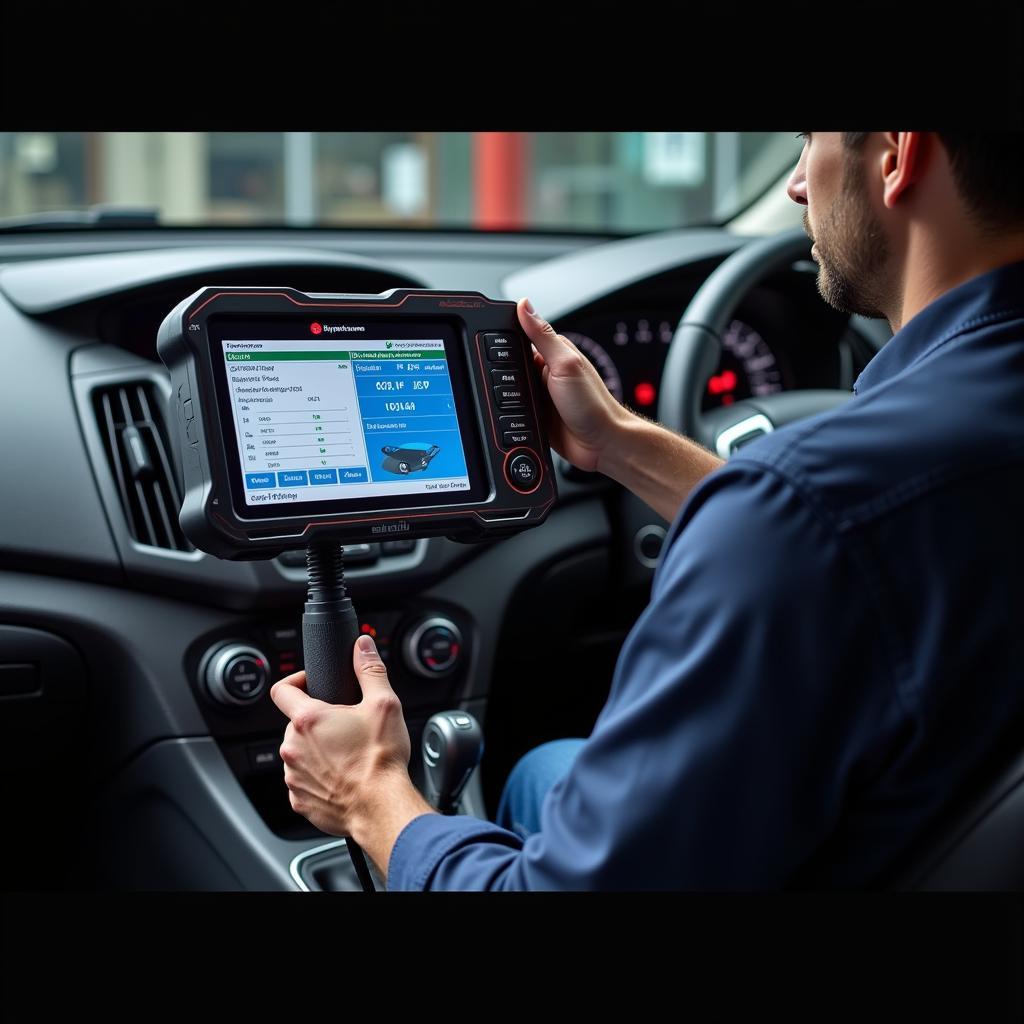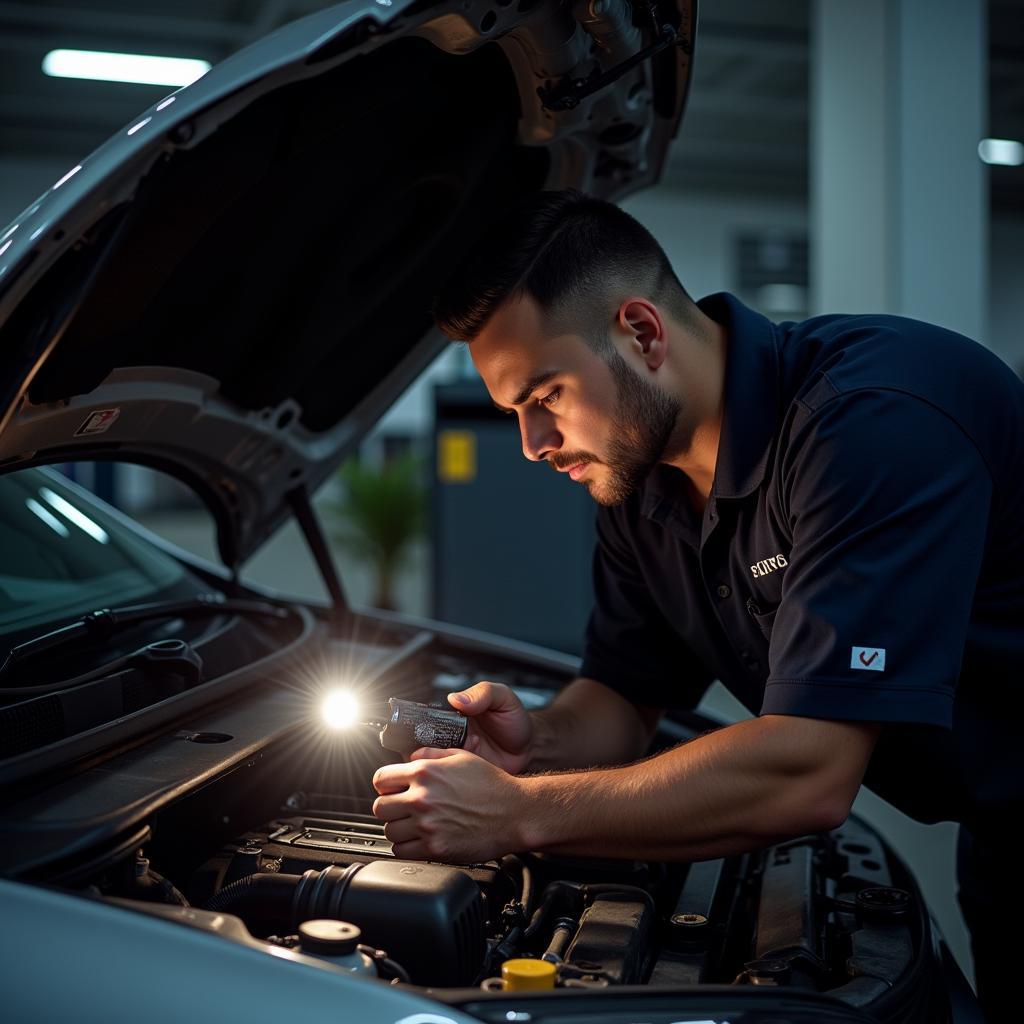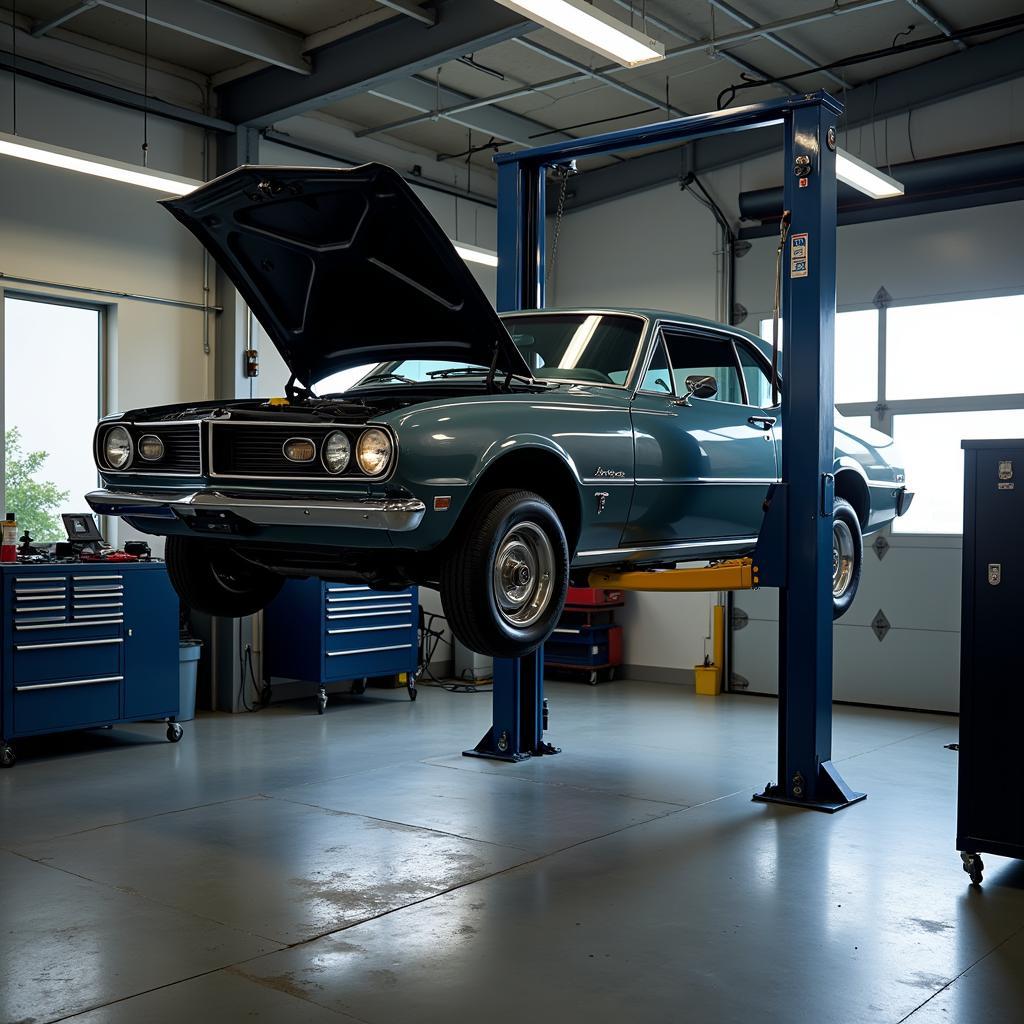Knowing how long a car diagnostic test takes is essential for planning your day, especially when you’re dealing with a potential car issue. While there’s no one-size-fits-all answer, we’ll break down the factors involved and give you a realistic timeframe.
Factors Affecting Diagnostic Test Duration
The time required for a car diagnostic test can vary depending on several factors:
- Complexity of the Problem: A simple sensor issue might be identified quickly, while a complex electrical problem could take significantly longer to diagnose.
- Mechanic’s Skill and Experience: An experienced mechanic familiar with your car’s make and model can often pinpoint issues faster.
- Diagnostic Equipment: Advanced scanners and software can speed up the process compared to older, less sophisticated tools.
- Vehicle Accessibility: Easy access to the car’s computer system and components allows for quicker testing.
 Mechanic using modern diagnostic equipment
Mechanic using modern diagnostic equipment
Typical Timeframes
Here’s a general estimate for different diagnostic scenarios:
- Basic Scan (30-60 minutes): This involves connecting a code reader to your car’s OBD-II port to retrieve error codes, providing a starting point for further investigation.
- In-Depth Diagnosis (1-2 hours): For complex issues, the mechanic might need to perform additional tests, analyze data logs, and consult technical resources, extending the diagnostic time.
- Additional Repairs (Variable): If the diagnostic test reveals problems requiring immediate repair, the timeframe will increase significantly depending on the repair’s nature and extent.
 Mechanic inspecting a car engine
Mechanic inspecting a car engine
Is a Car Diagnostic Test Worth It?
Absolutely. A car diagnostic test is a worthwhile investment for several reasons:
- Early Detection: Diagnosing problems early can prevent more serious and costly repairs down the road.
- Targeted Repairs: Knowing the exact issue eliminates guesswork and unnecessary repairs, saving you time and money.
- Peace of Mind: Having a professional assess your car’s health provides valuable peace of mind, especially before long trips.
Where to Get a Diagnostic Test
You have several options for getting your car diagnosed:
- Dealerships: They have specialized equipment and factory-trained technicians for your car’s make and model, but their services might come at a premium price.
- Independent Mechanics: Reputable independent shops can offer accurate diagnoses and repairs at potentially lower costs than dealerships.
- Auto Parts Stores: Some chain auto parts stores offer free code reading services, which can be helpful for basic diagnostics. However, keep in mind that they might not have the expertise or equipment for complex issues.
 Car on a lift in a repair shop
Car on a lift in a repair shop
Conclusion
While the duration of a car diagnostic test varies, understanding the factors involved and typical timeframes can help you plan accordingly. Remember, early detection through diagnostic tests can save you from more significant expenses and headaches down the road.
FAQs
Q: Can I diagnose car problems myself?
A: While you can buy OBD-II scanners for home use, they might not provide the same depth of information as professional tools. Plus, interpreting the results and diagnosing complex issues often require mechanical expertise.
Q: Do I need a diagnostic test even if my car’s check engine light isn’t on?
A: It’s a good idea to get periodic diagnostic checks, even without warning lights. These tests can identify potential problems early on, preventing unexpected breakdowns and costly repairs.
Q: How much does a diagnostic test cost?
A: Diagnostic test costs can range from free at some auto parts stores to $100 or more at dealerships and independent mechanics. It’s always wise to inquire about the cost beforehand.
Q: What is the difference between a diagnostic test and a car inspection?
A: A diagnostic test focuses on your car’s electronic systems, using a scanner to identify error codes and potential issues. A car inspection is a more comprehensive visual examination of your vehicle’s overall condition, including safety features, fluids, brakes, and more.
Car Diagnostic Test Scenarios:
Here are some common situations where a car diagnostic test is recommended:
- Check Engine Light On: This is the most obvious sign that your car needs a diagnostic test.
- Unusual Noises: Strange sounds from your engine, transmission, or other components could indicate underlying issues.
- Performance Problems: If your car hesitates, stalls, or lacks power, a diagnostic test can help identify the cause.
- Increased Fuel Consumption: A sudden drop in fuel economy might signal a problem with the engine or emissions system.
Looking for More Information?
Explore these related articles on DiagFixPro:
- How long does a diagnostic take for a car?
- How much does a diagnostic for a car cost?
- Where can I get a diagnostic check on my car?
- What are car diagnostics?
Need Assistance?
Contact us via WhatsApp: +1(641)206-8880, or Email: [email protected]. Our 24/7 customer support team is here to help!

Leave a Reply